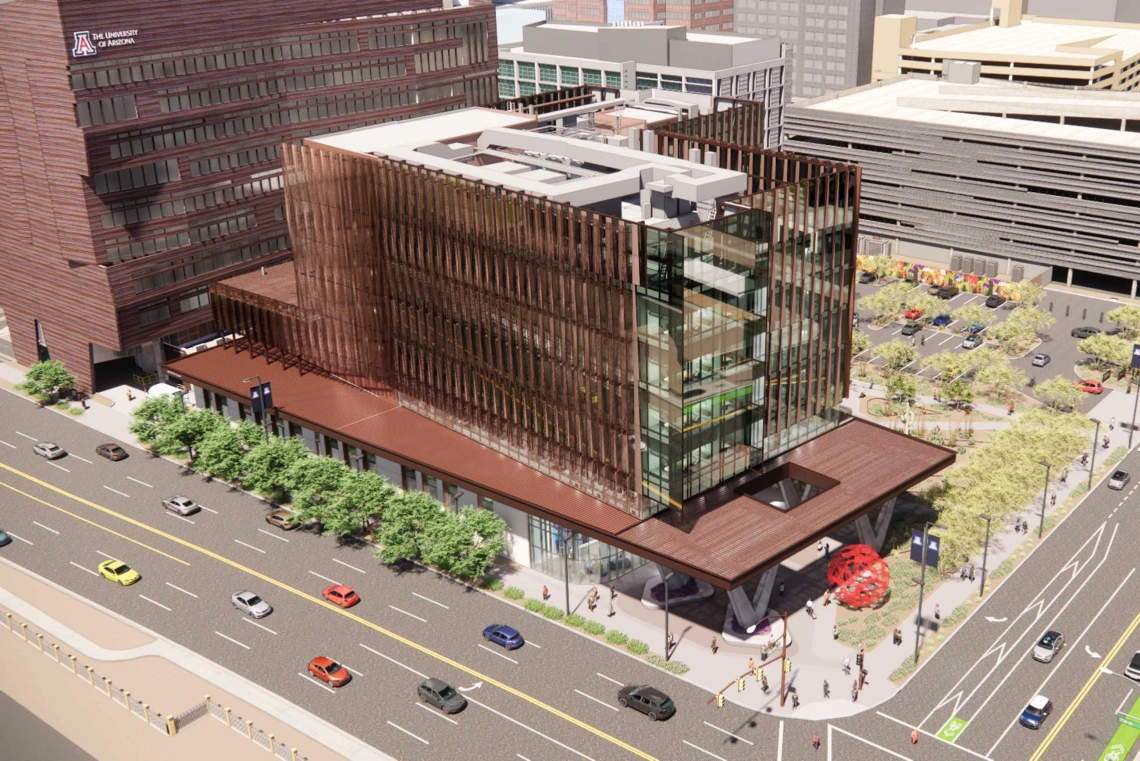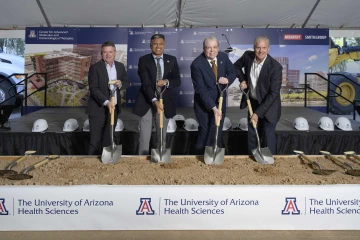Maricopa County doubles support of CAMI with additional $4M investment
The Maricopa County Board of Supervisors increased its financial support of CAMI to a total of $8 million with another $4 million distribution of ARPA funds.

The Center for Advanced Molecular and Immunological Therapies will be located at the corner and Seventh and Fillmore streets on the Phoenix Bioscience Core.
Illustration courtesy of McCarthy + SmithGroup
The University of Arizona Health Sciences Center for Advanced Molecular and Immunological Therapies received a second vote of support from the Maricopa County Board of Supervisors with the December 11 approval of $4 million in funding for the biomedical research hub being built in downtown Phoenix. The vote brings the county’s total investment to $8 million.
The Center for Advanced Molecular and Immunological Therapies, or CAMI, will accelerate the pursuit of novel therapies for cancers, autoimmune conditions and infectious diseases, including COVID-19. CAMI will advance immunological research already underway at the University of Arizona Health Sciences and bring in new ideas to improve health outcomes for people across Arizona and around the world.

(From left) Maricopa County Supervisor Bill Gates (District 3), CAMI Inaugural Executive Director Deepta Bhattacharya, PhD, U of A Health Sciences Senior Vice President Michael D. Dake, MD, and Maricopa County Supervisor Clint Hickman (District 4) attended the groundbreaking ceremony for the Center for Advanced Molecular and Immunological Therapies.
Photo by Kris Hanning, U of A Health Sciences Office of Communications
“By doubling down on its investment in CAMI, the Maricopa County Board of Supervisors is driving vital advancements in biomedical research while supporting financial growth in Phoenix,” said Michael D. Dake, MD, senior vice president for the University of Arizona Health Sciences. “The research being pursued at the Center for Advanced Molecular and Immunological Therapies will be instrumental in solving the critical health care problems of today and creating new solutions for future health challenges.”
This $4 million investment, like the first one in July 2023, comes from federal funds provided to Maricopa County through the American Rescue Plan Act, or ARPA. The county has allocated its $871 million ARPA allotment to programs, services and projects including public health infrastructure and workforce development.
The expanded investment in CAMI aligns with Maricopa County’s broader goals of growth and economic development detailed in its Fiscal Year 2023-2026 strategic plan.
“I was proud to attend CAMI’s groundbreaking ceremony in late October and see firsthand the incredible impact this new facility will have on residents of Maricopa County and Arizonans as a whole,” said Maricopa County Supervisor Clint Hickman, District 4. “It’s not only creating jobs and boosting the local economy – it’s growing Arizona’s legacy as an innovative public health leader and directly improving the quality of life for people needing treatment for life-threatening conditions and illnesses.”
A groundbreaking ceremony for the new building that will house CAMI was held Oct. 30 on the Phoenix Bioscience Core. Construction is expected to be completed in early 2027. In the meantime, CAMI research is underway in the Biomedical Sciences Partnership Building, which houses laboratory and administrative space for CAMI scientists.
The work done by CAMI researchers will address the disproportionate impacts of COVID-19 long COVID and future pandemics on the most vulnerable Arizonans. CAMI’s goal is to support the health of Arizona communities through real-time immune monitoring and profiling that can inform the creation of targeted, precision-based treatments to protect Arizona residents.
“This generous funding from the Maricopa County Board of Supervisors will allow us to pursue new therapies for infectious diseases, autoimmune conditions and cancers through immunological research, clinical investigation and entrepreneurship at the University of Arizona and with our partner institutions,” said Deepta Bhattacharya, PhD, inaugural executive director of CAMI and a professor of immunobiology at the College of Medicine – Tucson. “I am looking forward to seeing CAMI’s growth, not only as construction continues on our new building but also in the new research programs and collaborations we are putting in place as we focus on accelerating the diagnosis, prevention and treatment of diseases with an immunological basis.”
CAMI will anchor an innovation district at the corner of Seventh and Fillmore streets, establishing a national hub of cell- and gene-based therapy research, startup activity and corporate engagement. McCarthy-SmithGroup is designing and constructing the more than 200,000-square-foot, seven-story building that will house research laboratories, a clinical suite, administrative and meeting spaces, and an urban garden and café.
Contact
Phil Villarreal
U of A Health Sciences Office of Communications
520-403-1986, pvillarreal@arizona.edu

